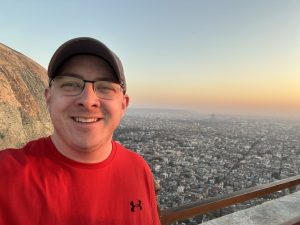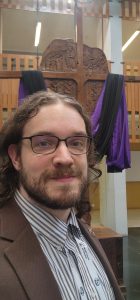For five days, hundreds of ELCA Lutherans descended on Phoenix, AZ, for the 2025 ELCA Churchwide Assembly. This gathering is set to do the business of the church: to receive reports from the churchwide officers, leaders, and units, to consider proposals from synod assemblies, elect officers and board members, establish ELCA churchwide policy, and to adopt a budget. The business is grounded in opportunities to worship together, to network with ELCA partners, and to live into our calling as the church for the sake of the world.
Whenever you put that many Lutherans in a room, one can expect worship will be holy and moving, and that is exactly what each worship experience was. From dynamic preaching to moving songs, each service had something for everyone. A highlight of worship was to see the diversity of leadership, including leaders with disabilities. While there were many times accessibility came into play, the worship space was laid out in a way that wheelchairs and walkers were not forced to be in the back. Extra space throughout gave room for those who found the small chairs constricting, and a ramp on one side of the stage was something that wasn’t an afterthought or just used by those who need it.
One of the major things that the assembly was tasked with was the election of both a Presiding Bishop and a Secretary. Giving thanks for Presiding Bishop Elizabeth Eaton and Secretary Deacon Sue Rothmeyer, we began to look towards what the next six years might look like under new leadership. From the very beginning, it was clear that our next leaders need to be bold in their proclamation of the gospel, bold in their service to the church, and ready for an ever-changing church. As the voting process continued, those who advanced were clear in their commitment to uplifting lay leaders, developing new ways of inviting more folks to the table and doubling down on our identity as beloved children of God. In the end, Bishop Yehiel Curry of the Metro Chicago Synod was elected as our Presiding Bishop, and Pastor CeeCee Mills from the North Carolina Synod was elected as Secretary. Both of these elections are a first for the ELCA, not only did we elect two BIPOC (Black, Indigenous, Person of Color) leaders, but all three of the top elected positions for the ELCA are held by diverse individuals.
Throughout the rest of the business of the church, a few things happened quietly that are important to note. The following memorials, resolutions sent from synod assemblies to the Churchwide Assembly were passed en bloc but could have an impact on our communities:
- A5: Youth Gathering Diversity, Equity, Inclusion and Accessibility
- Giving thanks to the Minneapolis Area Synod, the churchwide assembly requests that the ELCA Youth Gathering team explore ways to implement a racial equity audit for the Youth Gathering to address barriers for participation with the goal of increasing and strengthening the leadership of youth participants with persons of color and intersecting identities.
- B4: Child and Vulnerable Adult Protection
- Giving thanks to the Minneapolis Area Synod and the St. Paul Area Synod, the churchwide assembly urges synods to include the protection of children and vulnerable adults in their trainings for rostered ministers and other leaders in their synod and to adopt policies to ensure that all leaders who are working with children and vulnerable adults are protected, like ensuring training is done and background checks have been completed.
While neither of these memorials speaks directly to people with disabilities, they do speak to an urge in the church to be more aware of how our identities are played out and to provide resources to better live into them. Having served on the tAble planning team the last two cycles, I am excited to see how the ELCA Youth Gathering teams take to heart not only addressing barriers to individuals of color but also to youth with disabilities. What would it look like to see better representation throughout the entire Youth Gathering that reminds us that we are not just included be belong there?
As a church, we have done a good job of including people with disabilities; we have added ramps to stages and ensured accessible bathrooms are available, but we have only begun the work that is needed to move from being included to belonging. As an observer, I witnessed the inaccessibility of events like this, from the long hallways of a convention center to the assumptions made by others, frustrations for some ran high. The desire to be a more inclusive church is there, but we have failed in many ways. With the election of new leadership, it is our time to hold our elected officers accountable for the things they say and do. One of the things that continued to be a theme throughout the week together was our calling to be the church for the sake of the world, our calling to live boldly in service to a world longing for healing, justice, and hope. There were many missed opportunities to make this assembly more accessible. There were moments of changing direction after folks spoke up, but we have to do better, and I hope that we can move from inclusion to belonging.

Pastor Mack Patrick (he/they) is currently serving as Assistant to the Bishop in the Northern Illinois synod, where he oversees communications, stewardship, and youth ministry and is one of the newest members of the ELCA Disability Ministries advisory team.


 I am the son of not one but two Evangelical Lutheran Church in America pastors. I have been a part of the church my whole life. I currently work as a project officer for Mental Health Advocacy for the World Council of Churches (WCC), as well as being one of the WCC staff members responsible for the Ecumenical Disability Advocates’ Network (EDAN). It is that last role that makes me the most proud because as a person living with a life-long disability, being in a disability advocacy role is a powerful thing. “No conversation about us, without us,” right?
I am the son of not one but two Evangelical Lutheran Church in America pastors. I have been a part of the church my whole life. I currently work as a project officer for Mental Health Advocacy for the World Council of Churches (WCC), as well as being one of the WCC staff members responsible for the Ecumenical Disability Advocates’ Network (EDAN). It is that last role that makes me the most proud because as a person living with a life-long disability, being in a disability advocacy role is a powerful thing. “No conversation about us, without us,” right?